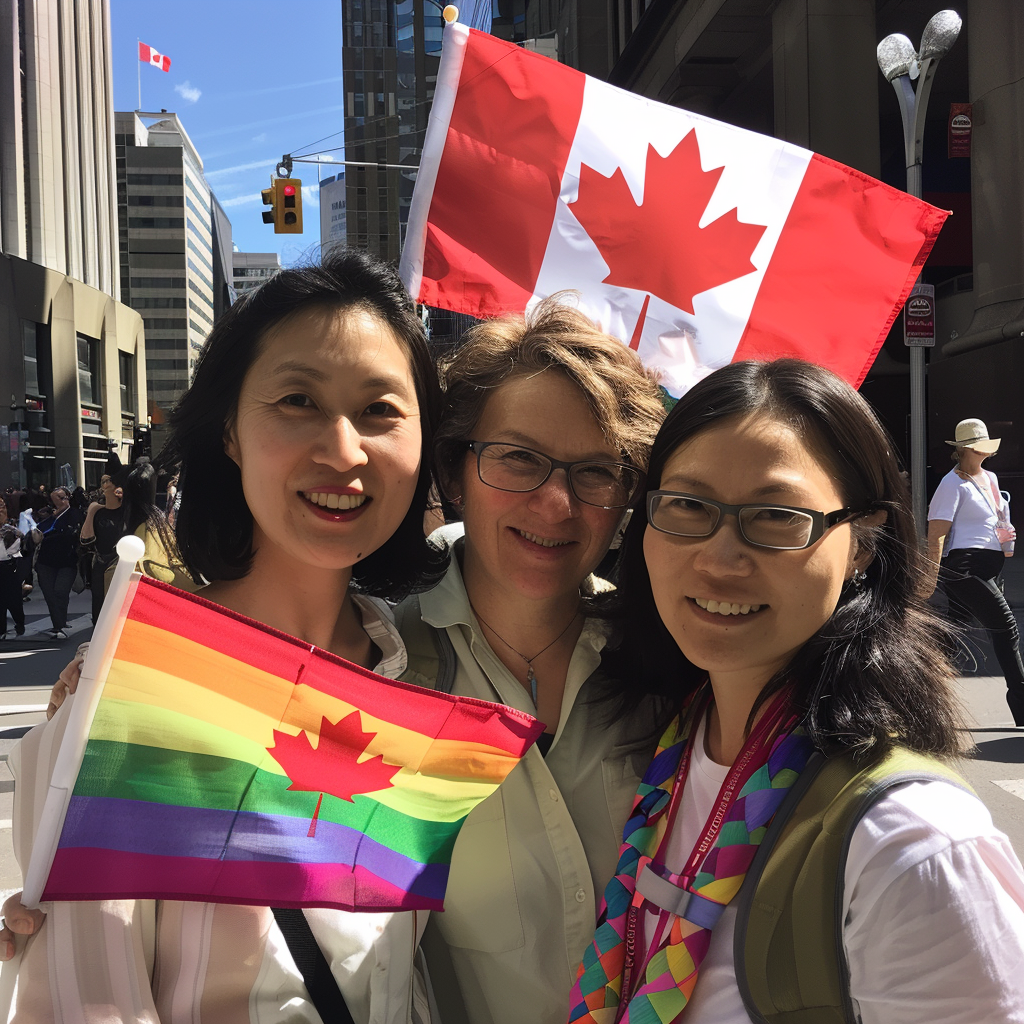
Japanese Lesbian Couple Granted Refugee Status in Canada
Two Japanese lesbian women were granted refugee status in Canada last September due to facing discrimination in Japan for being women and LGBTQ. Canada’s immigration authorities recognized the pervasive discrimination they faced, lack of legal protections in Japan for sexual minorities, compounded by being women. (45語)
日本語訳
「日本のレズビアンカップル、カナダで難民認定」
昨年9月、2人の日本人レズビアン女性がカナダで難民認定を受けました。女性でありLGBTQであるため、日本で差別を受けていたからです。カナダの移民当局は、彼女たちが直面した広範な差別、日本における性的少数者の法的保護の欠如、そして女性であることが原因と認めました。

単語・熟語チェック
・grant 与える、認める
・refugee status 難民認定
・discrimination 差別
・immigration authorities 移民当局
・pervasive 広範な、行き渡った
・lack of 〜の欠如
・legal protections 法的保護
・sexual minorities 性的少数者
単語解説
・lesbian
⇒レズビアン、レズビアンの女性を指す形容詞。ギリシア語の”Lesbos”島に由来する。この島に古代ギリシアの女性詩人サッフォーが住んでおり、同性愛者の女性を指す言葉の語源となった。
・couple
⇒カップル、恋人同士の2人を指す名詞。フランス語の”couplet”(小さな組)に由来する。
・grant
⇒与える、認める、許可するなどの意味の動詞。grant A to B “BにAを与える”と使う。
・refugee
⇒難民を指す名詞。フランス語の”refugier”(避難する)に由来。戦争や迫害から逃れてきた人を指す。
・status
⇒地位、身分、状態などを指す名詞。ラテン語の”stare”(立つ)に由来。難民認定を受けることで、その人の法的地位が変わる。
・discrimination
⇒差別の意味。接頭辞”dis-“(否定)とラテン語の”cernere”(区別する)が語源。人種、性別、宗教などに基づく不当な差別的扱いを指す。
・pervasive
⇒広範囲に広がった、蔓延しているという意味の形容詞。”pervade”(行き渡る)が語源。
・compound
⇒複合する、増幅するという意味の動詞。ここでは”さらに重なって”といった意味合い。
・legal protection
⇒法的保護の意味。法令によって一定の権利や待遇が保証されていること。
・sexual minority
⇒性的マイノリティの意味。LGBTなどの性的指向や性自認の少数者を指す。
原ちゃんチェック
今回の事例は、日本におけるLGBTQや女性に対する差別が国際的に認識され、カナダでの難民認定に繋がったことを示しています。日本ではまだ法的保護が十分に整っておらず、多くの性的少数者が困難な状況に置かれています。今回の認定は、日本の法制度や社会に対する改善の声を高める一助となるでしょう。また、他国での保護を求めるケースが増えることが予想され、国際的な人権問題としての認識が広がることが期待されます。
関連URL
原田英語深堀りチェック
【LGBTQに関する英語表現やイディオム20】
1. Come out of the closet [カミングアウトする] – To openly declare one’s sexual orientation or gender identity, especially when it differs from the heterosexual norm. (特に異性愛の規範と異なる場合に、自分の性的指向やジェンダーアイデンティティを公然と宣言すること。)
2. Pride parade [プライド・パレード] – An outdoor event celebrating LGBTQ identity, often involving marches, floats, and festivities. (LGBTQ のアイデンティティを祝う野外イベントで、しばしば行進、フロート、お祭りが行われる。)
3. Rainbow flag [レインボーフラッグ] – A multi-colored flag representing the diversity of the LGBTQ community. (LGBTQ コミュニティの多様性を表す多色の旗。)
4. Lavender marriage [ラベンダー結婚] – A marriage between a man and a woman in which one or both partners are homosexual, entered into to conceal their sexual orientation. (一方または両方のパートナーが同性愛者である男女の結婚で、性的指向を隠すために行われる。)
5. Drag queen [ドラッグ・クイーン] – A man who dresses and acts like a caricature of a woman, often for entertainment purposes. (男性が女性の風刺画のように服を着て行動すること。多くの場合、娯楽目的で行われる。)
6. Stonewall riots [ストーンウォールの反乱] – A series of spontaneous demonstrations by members of the LGBTQ community in 1969, considered the catalyst for the modern LGBTQ rights movement. (1969年にLGBTQコミュニティのメンバーによって起こった一連の自発的なデモンストレーションで、現代のLGBTQ権利運動の触媒となったと考えられている。)
7. Equality Act [平等法] – A bill in the United States that would amend the Civil Rights Act to prohibit discrimination on the basis of sexual orientation and gender identity. (米国の法案で、公民権法を改正して、性的指向とジェンダーアイデンティティに基づく差別を禁止するもの。)
8. Preferred pronouns [希望の代名詞] – The pronouns that a person chooses to use for themselves, often to reflect their gender identity. (ある人が自分のために使うことを選んだ代名詞で、多くの場合、自分のジェンダーアイデンティティを反映するために使われる。)
9. Gender-fluid [ジェンダーフルイド] – Having a gender identity that varies over time or is not fixed. (時間とともに変化したり、固定されていないジェンダーアイデンティティを持つこと。)
10. Deadname [デッドネーム] – The birth name of a transgender person that they no longer use upon transitioning. (トランスジェンダーの人が移行後に使わなくなった出生時の名前。)
11. Queer [クィア] – An umbrella term for sexual and gender minorities who are not heterosexual or are not cisgender. (異性愛者ではない、またはシスジェンダーではない性的マイノリティやジェンダーマイノリティを指す総称。)
12. Ally [アライ] – A person who supports and stands up for the rights of LGBTQ people, but who is not necessarily LGBTQ themselves. (LGBTQ の人々の権利を支持し、擁護する人。ただし、必ずしも本人が LGBTQ であるとは限らない。)
13. Intersectionality [インターセクショナリティ] – The complex, cumulative way in which the effects of multiple forms of discrimination (such as racism, sexism, and classism) combine, overlap, or intersect, especially in the experiences of marginalized individuals or groups. (人種差別、性差別、階級差別など、複数の差別の影響が、特にマージナライズされた個人やグループの経験において、複雑に累積して組み合わさったり、重なり合ったり、交差したりする様子。)
14. Pansexual [パンセクシャル] – Sexually attracted to people regardless of their sex or gender identity. (相手の性別やジェンダーアイデンティティに関係なく、性的に惹かれること。)
15. Genderqueer [ジェンダークィア] – A person who does not subscribe to conventional gender distinctions but identifies with neither, both, or a combination of male and female genders. (従来のジェンダーの区別に縛られず、男性でも女性でもない、両方、またはその組み合わせとして自認する人。)
16. LGBT+ [LGBT+] – An acronym for lesbian, gay, bisexual, transgender, and other sexual and gender minorities. (レズビアン、ゲイ、バイセクシャル、トランスジェンダー、およびその他の性的マイノリティやジェンダーマイノリティの頭文字をとった略語。)
17. Cishet [シスヘット] – A slang term for someone who is both cisgender and heterosexual. (シスジェンダーでかつ異性愛者である人を指す俗語。)
18. Passing [パッシング] – The ability of a person to be regarded as a member of an identity group or category different from their own, most often used in the context of racial identity or sexual orientation and gender identity. (ある人が、自分とは異なるアイデンティティグループやカテゴリーのメンバーとみなされる能力。最も多く使われるのは、人種的アイデンティティや性的指向、ジェンダーアイデンティティの文脈。)
19. Heteronormativity [ヘテロノーマティビティ] – The belief that heterosexuality is the default, preferred, or normal mode of sexual orientation, and that sexual and marital relations are most fitting between people of opposite sex. (異性愛が性的指向のデフォルト、好ましい、または正常なモードであり、性的関係や婚姻関係は異性間が最もふさわしいという信念。)
20. Pink washing [ピンクウォッシング] – The promotion of LGBTQ rights and representation by an organization or government to downplay or distract from other negative policies or actions. (他のネガティブな政策や行動を軽視したり、そらしたりするために、組織や政府がLGBTQの権利や表現を推進すること。)






